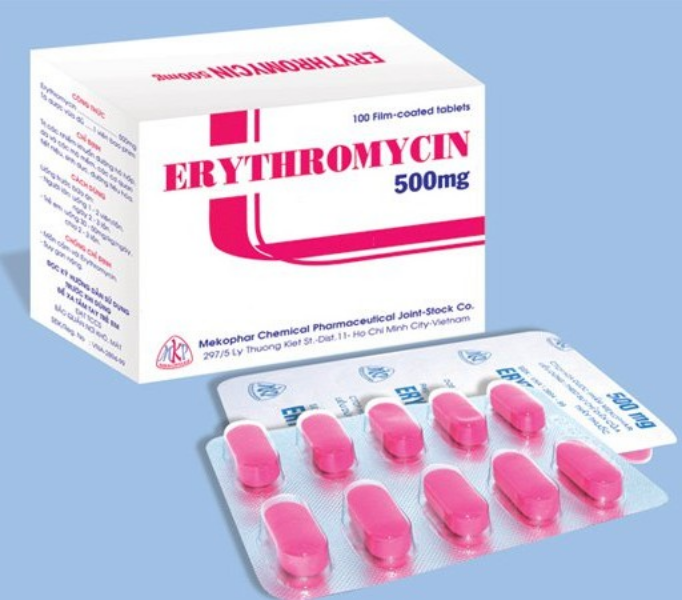Erythromycin is an antibiotic used to treat bacterial infection in the respiratory system, digestive system, skin, eyes, ears and urinary system.
The medicine belongs to the macroalides category and works by preventing the growth and reproduction of germs.
How to use Erythromycin:
You should consult a doctor before using the medicine and follow the doctor’s instructions regarding the dose, timing and duration of treatment.
The medicine can be taken orally or injection,
and it is preferable to take it before food to improve the absorption of the drug.
The recommended dose should not be exceeded in any way.
Erythromycin side effects:
The drug can cause some side effects such as: nausea, vomiting, diarrhea, vomiting, headache, dizziness, rash, itching and difficulty breathing,
and the doctor should be contacted in the event of any of these symptoms, especially if they are serious or annoying.
Pharmaceutical doses:The recommended dose of Erythromycin varies according to the type of infection and the patient’s condition, and the recommended dose should not be exceeded in any way.
Contraindications and warnings:
The use of the drug should be avoided if there is an allergy to any component of the drug or if any previous allergy to these substances is present.
Consult the specialist doctor before using the drug in the event of pregnancy or breastfeeding,
and the drug should not be used in the event of some specific diseases such as liver disorders, kidney failure and blood clotting.
Care must be used to use the drug if other drugs that affect the liver or reduce the level of sodium in the blood.
Drug manufacturer:
Erythromycin is manufactured by several different pharmaceutical companies around the world,
and is available in most pharmacies under several commercial names such as Erythrocin and Erythromycin ethylsucinate and others.
The medicine should be purchased from a reliable source and avoid purchasing the drug from unreliable sources.
The medicine should also be kept at room temperature and away from moisture and excessive heat.
Here are some links to manufacturers of Erythromycin:
1. Pfizer: https://www.pfizer.com
2. Abbott Laboratories: https://www.abbott.com
3. Glaxosmithkline: https://www.gsk.com
4. Merck & Co https://I.
Here are a few more links to manufacturers of Erythromycin:
5. Roche: https://www.roche.com
6. Aurobindo Pharma: https://www.aubindo.com
7. Teva Pharmaceutical Industries: https://www.tevapharm.com
8. Novartis: https://www.novartis.com
Please note that these links are for the companyees ’Ficial websites, where you can find more information about themsists,

Including Erythromycin.Erythromycin features:
– You should consult a doctor before using the medicine and follow the doctor’s instructions regarding the dose, timing and duration of treatment.
1. High effectiveness: Erythromycin is effective for treating many bacterial diseases, such as sore throat, ear, respiratory system, skin, eyes, urinary tract and sudden fever.
2. Ease of use: Erythromycin is available in various forms, including tablets, capsules, injections, ointments, and gel, which facilitates its use in a way that suits each case.
3. Safe for use: Erythromycin is safe for use, and it can be safely used to treat children
and adults, and can be used during pregnancy and lactation after consulting a doctor.
Medicines that should be avoided while using the drug:
1. Anti -Depression Medicines: The drug should be avoided with some antidepressants, such as serialin and massacle, as this can increase the effects of the medications and increase the risk of side effects.
2. Anti -clotting medications: Erythromycin should be avoided with some anticoagulant medications, such as warfarin and heparin, as this can increase the effects of medications and increase the risk of bleeding.
3. anti -AIDS drugs: Erythromycin should be avoided with some anti -AIDS antiviral drugs, such as resonafir and Ambrinafir, as this can increase the effects of medications and increase the risk of side effects.
Medicine forms:
1. Tablets: Erythromycin tablets are available in various doses, and are used to treat many bacterial diseases.
2. Capsules: Erythromycin capsules are available in various doses, and are used to treat many bacterial diseases.
3. Solid solutions: Solid solutions are used from Erythromycin to treat acute bacterial diseases, and are given by injection in muscles or veins.
4. Also ointments and majesty: Ointments and gel are used from this medicine to treat skin bacterial diseases, such as acne and skin inflammation.
It should be avoided using it with some specific medications and under the supervision of a specialist.
In general, Erythromycin is an effective and safe antibiotic to treat many bacterial diseases.
Erythromycin can be used to treat many bacterial diseases, and is effective in combating acute and chronic bacterial infection.
It is also a safe drug in use and can be used to treat children and adults.
The dose and timing instructions should always be followed by the specialist when using this medicine.
Among the diseases that can be treated with Erythromycin:
Sudden fever.
Enas, ear, respiratory system, skin, eyes and urinary tract.
Also acne and skin inflammation.
Erythromycin should be avoided with some medications such as anti -depressants,
anticoagulant drugs and anti -AIDS antiviral drugs,Because this can increase the effects of medications and increase the risk of side effects.
You should consult a specialist before using Erythromycin during pregnancy and lactation.
Pregnancy and breastfeeding:
This medicine must be taken as prescribed by the specialist doctor and the specified dose and timing instructions must be followed.
Any uncomfortable side effects should be reported to the specialist.
The drug can be used to treat many bacterial diseases, including:
Erythromycin is used to treat many bacterial diseases, including:
1. Sorel, tonsillitis, rhinitis and inflammation of the lungs and sinusitis.
2. Also, skin infections such as acne, pink acne, and red dermatitis (Rosasia).
3. The upper respiratory infection such as otitis and laryngitis.
4. In addition, Campylobacter.
5. Also, infections of the sexual area, such as chlamydia and syphilis.
6. Eye infection, such as eyelid.
7. Bacterial infection in the intestine, stomach and colon.
It is noted that Erythromycin is not considered the initial treatment for some of these diseases, but rather an alternative to the treatment that cannot be used.
You should consult a doctor before taking any medicine and follow his recommendations.
For the article summary:
Erythromycin is an antibiotic used to treat bacterial infection in the respiratory system, digestive system, skin, eyes, ears and urinary system.
The medicine is taken orally or injection, and it is preferable to take it before food to improve the absorption of the drug.
The side effects of the drug also include nausea, vomiting, diarrhea,
headache, dizziness, rash, itching and difficulty breathing.
The recommended dose for the drug varies according to the type of infection and the patient’s condition.
– You should avoid using the drug if there is an allergy to any component of the drug or in the event of any previous allergy to these substances.
Erythromycin is also available in most pharmacies under several commercial names such as Erythrocin, Erythromycin ethylsucinate and others.

